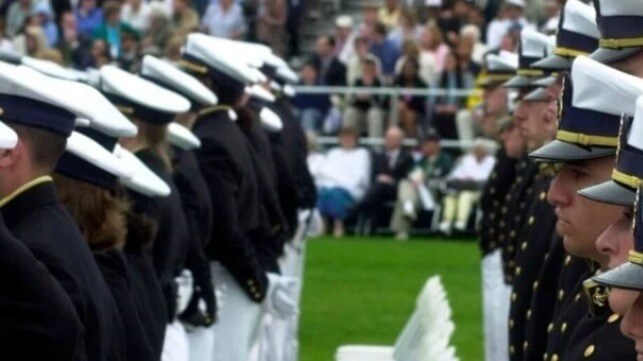Adm. Schultz: Coast Guard Sexual Assault Report Was Withheld From Congress

The House Oversight Committee has released its interim findings on an 18-month review of Operation Fouled Anchor, a sweeping investigation into sexual assault at the U.S. Coast Guard Academy which was buried by the service's leadership. During Operation Fouled Anchor, the Coast Guard Investigative Service found that dozens of allegations of criminal misconduct from the late 1980s through 2006 were given de minimis treatment by Academy administrators: only five cases were ever referred to law enforcement, allowing almost all of the alleged perpetrators to quietly exit the school or to continue their careers. The top-line finding of the report was that CGA had a "disturbing pattern of conducting internal administrative investigations and/or initiating disenrollment for sexual misconduct instead of referring the matter for criminal investigation."
By the time Operation Fouled Anchor's six-year-long investigation concluded, 70 CGIS personnel had spent 20,000 hours examining these allegations and compiling a report. The existence of the investigation and the final report were deliberately hidden from Congressional oversight, former commandant Adm. Karl Schultz (ret'd) confirmed to the committee in a transcribed interview.
"That was a decision by me to not make a notification [to Congress]. I own that exclusively," Adm. Schultz told the committee. "I think every commandant that served from that period of time, through and including me, has some, some stink on them on this issue, you know."
In a conversation last week with CNN's Melanie Hicken and Blake Ellis - who first broke the OFA story in 2023 - Adm. Schultz said that he withheld the existence of Operation Fouled Anchor from Congress because he did not trust Congress to protect victims' identities. "I knew [Congress] would see it as, ‘Here’s the scandal and that they would blow it up,'" Schultz said - thereby leading to the disclosure of individual victims' personal information.
Survivors reacted to this explanation with anger, according to Denise Rucker Krepp, a former Coast Guard officer and former chief counsel at MARAD. "'Another big lie.' 'What a joke.' 'Is he serious?' All comments shared with me by survivors in the minutes after the CNN article was published," said Krepp. "After decades of no accountability, survivors did not believe Schultz’s grandiose pronouncements."
Other factors
Documents from Adm. Schultz's tenure at the Coast Guard show that other factors - including reputational risk - were considered internally before he decided to conceal the report.
In October 2018, top government-relations officials at Coast Guard headquarters held an extended discussion on whether or not to brief Congress on OFA. Meeting minutes showed that at the time, these officials were concerned about the poor "optics" of the investigation's memorable name, "Operation Fouled Anchor." They documented internal concerns that briefing Congress would lead to "comprehensive Congressional investigations, hearings, and media interest" and could prompt uncomfortable questions about why "the rates of sexual assault reporting have not appreciably changed" at the Coast Guard Academy since Operation Fouled Anchor began (reporting rates had in fact doubled from 2009-17).
The meeting minutes include a handwritten list of "pros and cons" for informing Congress, allegedly compiled by Vice Commandant Adm. Charles Ray. "Pros" included "rip the band aid off" and "cultural guilt purged." "Cons" included "investigations without end," "no bright line 2006" - the final year of OFA's scope - and "no victims coming forward now." Concerns about revictimizing survivors appeared as the final item on the list.
Continued obstruction
The House Committee on Oversight alleges that the Coast Guard is still withholding information under Adm. Schultz's successor, Commandant Adm. Linda Fagan. Though the USCG has identified about 1.8 million pages of documentation that is potentially relevant to the committee's work, it has so far produced just 12,000 pages, and has refused to provide a timeline for the rest. The committee's members accused Coast Guard leadership of a long-term pattern of prioritizing institutional preservation over accountability.
"The Department of Homeland Security (DHS) and USCG consistently demonstrated recalcitrance in providing all the requested documents to the Committee. DHS claimed sensitivity concerns to justify withholding thousands of pages, offering limited in camera reviews for certain materials relating to the decision to withhold OFA from Congress," the committee wrote. "Withholding critical information has not only hindered the investigation, but also suggests a broader and continued effort to avoid accountability, putting service members at risk.
No comments:
Post a Comment